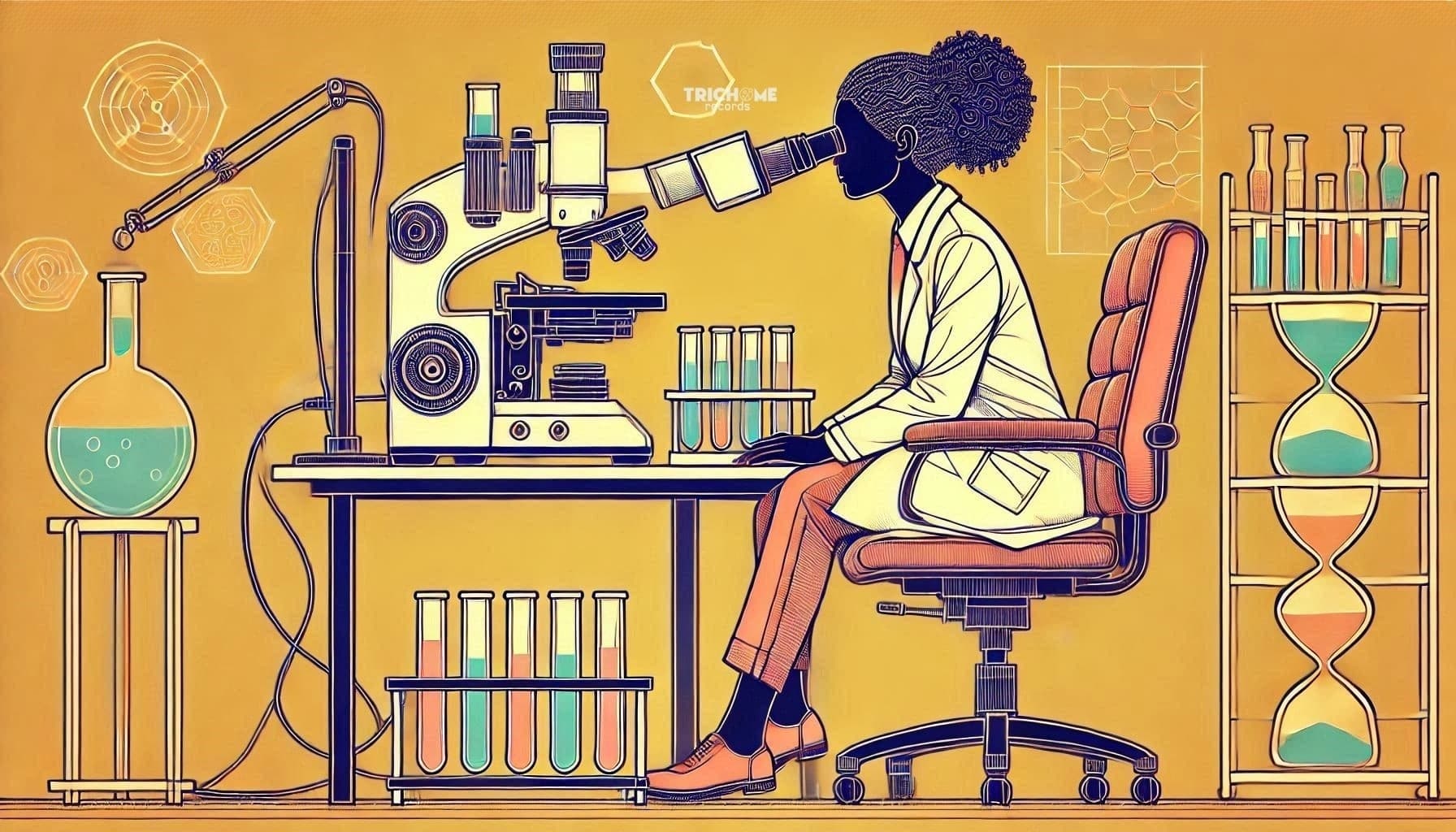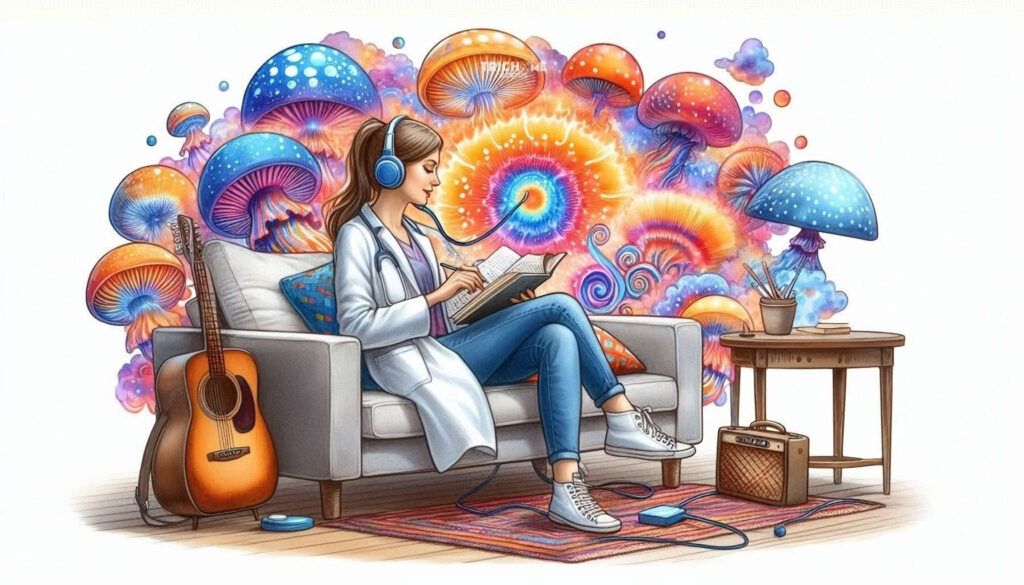Recently updated on December 21st, 2024 at 01:16 pm
The Therapeutic Symphony: Music’s Guidance in Psychedelic Experiences
As you delve deeper into the world of psychedelic therapy, it becomes evident just how crucial music is in facilitating these profound experiences. It’s fascinating to consider that as early as the 1960s, music therapists were collaborating with researchers to explore the impact of sound on psychedelic experiences. This marked a significant leap in understanding how auditory stimuli can enhance therapeutic outcomes. One of the voices in this field was Helen Bonny. A pioneering figure whose work at the Maryland Psychiatric Research Center in 1968 transformed the landscape of psychedelic therapy. She played an instrumental role in developing practices that are now foundational in psychedelic therapy. Her recommendations are not just historical notes; they are practical guidelines still applied today. For example:
- Eyeshades: These limit visual distractions, allowing individuals to focus inwardly.
- Stereophonic earphones: Deliver music directly to the listener, creating a deeply immersive auditory experience.
- Expressive Techniques: Bonny focused on how music could unlock emotional layers and foster insights during psychedelic sessions.
- Holistic Practice: She highlighted that both the music and the therapeutic setting are crucial in achieving optimal outcomes.
Bonny’s approach ensures that the therapeutic journey is enriched by music, transforming the experience into something truly magical. Just as you may have found solace and meaning through music in your life, it serves a similar purpose in guiding individuals through their psychedelic journeys.
Contemporary Practices in Music-Assisted Psychedelic Therapy
Building on the foundational work of pioneers like Helen Bonny, contemporary psychedelic therapy continues to emphasize the importance of music in guiding participants through their profound journeys. After all, you might recall how certain songs evoke emotions, memories, or even a sense of connection. In psychedelic therapy, these musical selections serve as a conduit to deeper healing and understanding. Modern practices have evolved to create an even more immersive environment for clients. Here are some of the key components utilized in contemporary settings:
- Eyeshades: These enhance the experience by blocking out distractions, allowing participants to focus entirely on the auditory landscape.
- Stereophonic earphones: Deliver high-fidelity sound that envelops users, fostering richer internal experiences.
- Carefully curated playlists: Therapists now design musical journeys that align with therapeutic goals, taking into account the emotional arcs participants might traverse.
Just as the music in your life resonates with your personal struggles, the right soundscapes in these sessions can evoke cathartic release and transformative insights, paving the way for healing and connection in our often disconnected modern world.
 The Countercultural Roots of Psychedelic Studies And Music’s Guidance in Psychedelic Experiences
The Countercultural Roots of Psychedelic Studies And Music’s Guidance in Psychedelic Experiences
Association with the 60s Counterculture
It’s impossible to explore the world of psychedelic studies without acknowledging its deep roots in the counterculture of the 1960s. This was a time marked by a fierce rebellion against the status quo, where beliefs around societal norms and authority were being questioned. The early psychedelic researchers were often inspired by the same ideals that fueled anti-war protests and civil rights movements.
- Music: Artists like The Grateful Dead and Jefferson Airplane not only provided a soundtrack for these movements but also became symbols of freedom and exploration.
- Community: The push for collective experiences resonated with both psychedelic researchers and the counterculture, emphasizing the significance of shared journeys.
Revolutionary Potential and Anti-Capitalist Sentiments
For many of us, the allure of psychedelics lies in their revolutionary potential. Much of the early psychedelic research was intertwined with anti-capitalist sentiments, reflecting a desire to transcend consumerism and reclaim authentic ways of living. This was an assertion of individuality against a backdrop of conformity.
- Mind Expansion: The belief that psychedelics could awaken consciousness and provide insights into alternative realities fueled hope for a societal revolution.
- Community Healing: The focus was not just on the individual but on fostering communal ties and understanding our interdependence.
Enclosure in Modern Institutions
Yet, as we reflect on this history, we must recognize the struggle against the enclosure within modern institutions. Just like you might feel confined in an academic setting, the pioneers of psychedelic studies found themselves at odds with mainstream medical and psychological frameworks.
- Institutional Resistance: Their attempts to explore psychedelics were often met with skepticism and judgment.
- Reclaiming Narrative: Through ongoing research and advocacy, there’s a concerted effort to break free from these confines, fully embracing the countercultural, transformative potential of psychedelics.
These roots not only shape the current landscape of research but also resonate with anyone who longs for deeper connections and a shift in the prevailing narrative of our times.
 Line of Flight: Liberation Through Psychedelics
Line of Flight: Liberation Through Psychedelics
Exploration of Psychedelics as a Path to Escape Modern Life
As you dive deeper into the psychedelic experience, it’s easy to see how these substances offer a profound way to escape the pressures of modern life. Many people, like you, are searching for a way out—away from the repetitive grind and disconnection often felt in today’s fast-paced society and listen to some psy chill music or other ambient styles.
- Altered States: Psychedelics can facilitate states of consciousness that allow you to break free from the confines of reality, offering new perspectives and insights.
- Inner Journeys: They open the door to self-exploration, enabling profound encounters with your inner thoughts and feelings.
Sharing in these experiences can lead to a collective understanding and a sense of freedom from societal constraints.
Recognition of the Importance of Collective Existence
In this journey, many have found that liberation is not merely about individual salvation but about recognizing our shared humanity. The psychedelic experience often emphasizes:
- Community Connection: Participants frequently report feelings of unity and interdependence, reminding us that we are not isolated beings but part of a broader tapestry.
- Collective Healing: By embarking on these journeys together, you reinforce the understanding that healing is a communal effort.
As you witness the powerful transformations arising from these shared experiences, the realization grows: our collective existence in this world is worth nurturing and celebrating.
 Inception of Music Therapy in Psychedelic Research and Music’s Guidance in Psychedelic Experiences
Inception of Music Therapy in Psychedelic Research and Music’s Guidance in Psychedelic Experiences
As you reflect on the journey through psychedelic studies, it’s refreshing to see how music therapy has emerged as a vital component. In the early 1960s, researchers began to explore how music could not only accompany but enhance psychedelic experiences. The idea was simple yet profound: the right sound could shape one’s journey, guiding emotions and facilitating deeper exploration.
- Collaborative Efforts: Music therapists worked closely with psychedelic researchers, laying the groundwork for integrating sound into therapeutic practices.
Preparation Techniques Involving Music in Therapy
Bonny and her colleagues developed preparation techniques that remain relevant today. For instance:
- Eyeshades: Allowing clients to limit visual distractions, enabling them to immerse fully in the auditory experience.
- Relaxed Environment: Laying comfortably on a couch sets the scene for a more profound connection to the music.
By marrying music with psychedelics, therapists create enriching environments conducive to healing and discovery. These techniques not only enhance the experience but also echo the power of music you may have felt in your own life.
